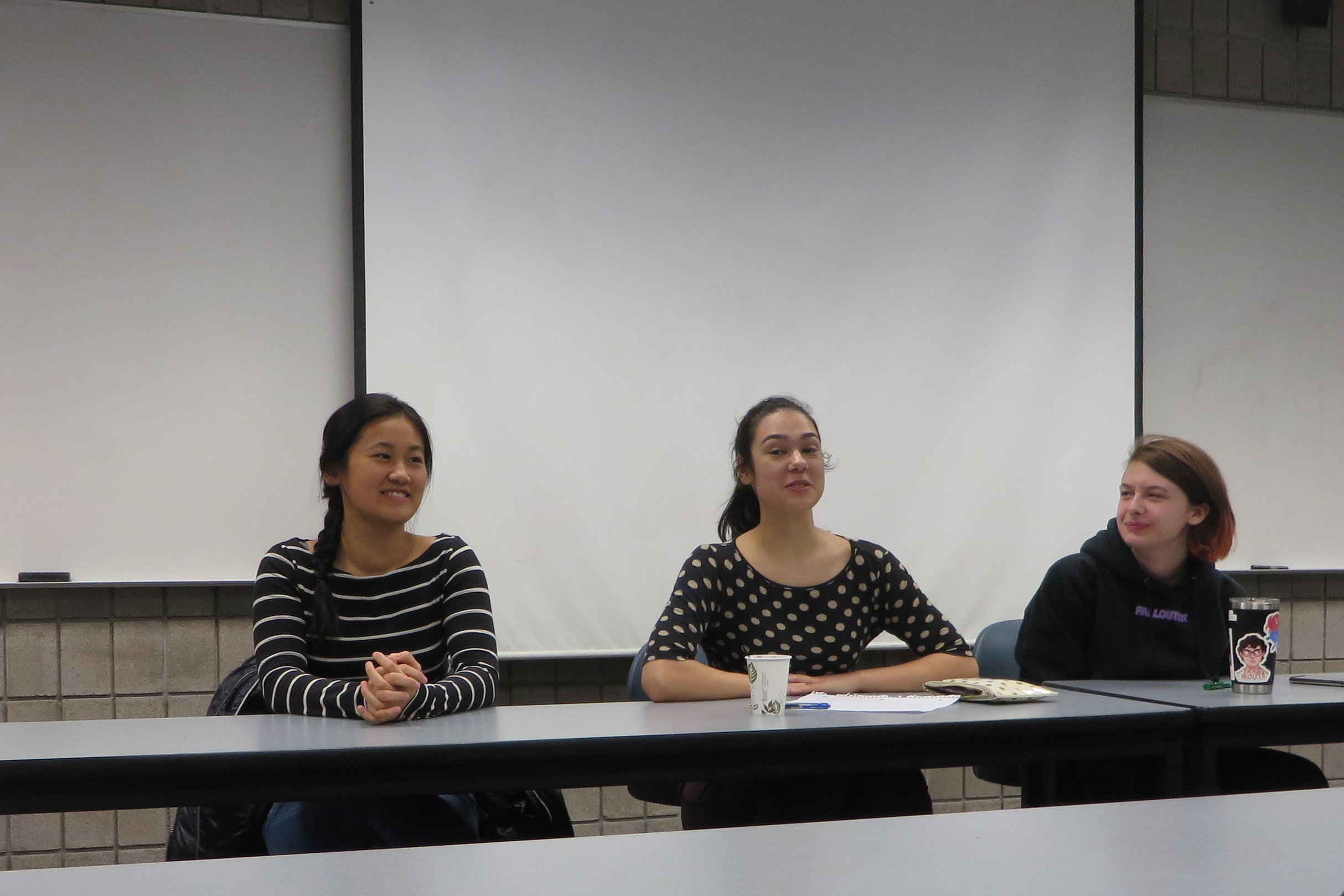What Students Wish Faculty Knew
Inclusive Excellence Initiative Event
Student Panelists: (l to r) Anna Kasper, Eva Earnest, Lacey Dallum
Three articulate and enthusiastic STEM students sat in front of an audience-filled room of College of Science (COS) faculty, staff and students. They formed a voluntary panel communicating useful information during the COS Inclusive Excellence event, “What Students Wish Faculty Knew.”
The panelists shared personal viewpoints and perspectives. Anna Kasper, a first-year biology major uses an interpreter in class so she shared her challenges and offered suggestions on how to improve the classroom climate for those who are deaf or hard of hearing. Both Lacey Dallum (computer science) and Eva Earnest (biochemistry) are second-year students taking part in the Learning Assistant program and find themselves even more focused on classroom participation and interactions because of the program.
As a student-focused institution, it’s important to know how faculty can best meet their students’ needs. Some faculty don’t always have the chance to hear how students view the classroom environment, course instruction or challenges they face. Students may be dealing with insecurity, hesitancy to speak up, or stress regarding course content comprehension. The more faculty understand their students and view them as well-rounded individuals who bring much to the classroom, the better the rapport and communication will be between them. One student remarked that kudos should be given to those faculty who attended this event, realizing it may have been an uncomfortable but helpful conversation to partake in.
The event consisted of twenty minutes of panel/audience discussion with questions anonymously submitted on note cards. This was followed by a twenty minute breakout session (small groups brainstorming strategies to improve faculty/student communications) and a final five minutes to share key take-aways from the session.
The panelists were asked to share a positive experience as well as a challenging situation they had dealt with involving faculty.
Positive Examples Given by the Panel:
- “I feel so much more comfortable when a professor remembers something I’ve shared with him/her earlier and mentions it to me-a plus also if he/she remembers my name.” - Eva Earnest
- “It’s great when faculty communicate opportunities outside of class, since a huge part of what I get out of education is experiential learning.” – Anna Kasper
Challenging Examples Given by Panel:
- “One time, when I was in class doing an activity, the teacher seemed to hover over me as I was doing my work. I believe this had to with the fact that I was deaf, and while they may have had good intentions and been trying to make sure everything had been communicated clearly to me, it made me feel as if they saw me as incapable.” - Anna Kasper
- “It would be helpful if faculty made time during class to check in and see if students are following. They don’t always do that and it is a huge indicator of where more time needs to be spent on a specific subject or point.” - Lacey Dallum
Likewise, Dullum shared how she does her part in noting those areas she doesn’t fully understand during class. She highlights or stars those areas in her notes, reminding her to go back to it during office hours.
The Imposter Syndrome was discussed (a possible future discussion session in and of itself). One panelist stated a professor re-directed her thinking about the syndrome and said everyone has it (faculty and students alike). However, being the only female in a male dominated classroom increased her insecure feeling of being perceived as knowing less. She shared the feeling of holding back asking questions in class and saving them for the one-on-one time with the professor.
The key take-away was just how much encouraging comments coming from faculty matter to students. It was also suggested that faculty propose questions they may have had as a student. This allows students to learn more about points they may not think to ask about.
The fifty-minute session was one of many Inclusive Excellence events created for COS faculty, staff and students. Embarking on year three of a five year grant initiative, all events are intended to encourage discussions and strategies of best ways to build on creating an inclusive and welcoming learning environment for all students in STEM. Workshops, seminars, discussions and internationally acclaimed keynote speakers are offered throughout the year focusing on racism, gender bias, gender identity, unconscious bias, mental health and more.
Visit Inclusive Excellence for more information and to learn about upcoming events.










